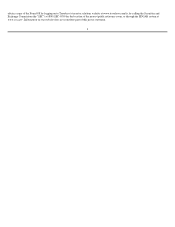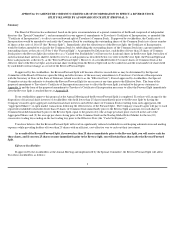Travelzoo 2012 Annual Report Download - page 20
Download and view the complete annual report
Please find page 20 of the 2012 Travelzoo annual report below. You can navigate through the pages in the report by either clicking on the pages listed below, or by using the keyword search tool below to find specific information within the annual report.
Any Cashed
-
Out Stockholder with share certificates will receive a letter of transmittal after the Reverse/Forward Split is completed. In order
to receive their cash payments with respect to such shares, these stockholders must complete and sign the letter of transmittal and return it with
their stock certificate(s) to Travelzoo's transfer agent, Computershare Trust Company, N.A., before they can receive cash payment for those
shares. Even if approved by stockholders, the Special Committee retains the authority to abandon the Reverse/Forward Split for any reason at any
time prior to the Effective Date.
U.S. Federal Income Tax Consequences
The following is a summary of the U.S. federal income tax consequences of the consummation of the Reverse/Forward Split generally
applicable to holders of the Common Stock and to us. This summary addresses only those holders of Common Stock that have held, and
will hold,
their shares as capital assets. This summary does not discuss all aspects of U.S. federal income taxation which may be important to holders of
Common Stock in light of their individual circumstances or that are subject to special rules (such as financial institutions, insurance companies,
broker
-
dealers, tax
-
exempt organizations, regulated investment companies or real estate trusts, partnerships or other flow
-
through entities for U.S.
federal income tax purposes and their partners or members, holders who received Common Stock as compensation for services or pursuant to the
exercise of an employee stock option, or stockholders who have held, or will hold, Common Stock as part of a straddle, hedging, or conversion
transaction for U.S. federal income tax purposes). The following summary is based upon U.S. federal income tax law, as currently in effect, which is
subject to differing interpretations or change, possibly on a retroactive basis. Further, no ruling from the Internal Revenue Service (the "IRS") or
opinion of counsel has been obtained in connection with the Reverse/Forward Split. Tax consequences under state, local, foreign, and other laws
are not addressed herein. Each holder of Common Stock is advised to consult his or her tax advisor as to the particular facts and circumstances
which might be unique to such holder, and also to any state, local, foreign, and other tax consequences of the Reverse/Forward Split, in light of his
or her specific circumstances.
For purposes of the discussion below, a “
U.S. Holder
” is a beneficial owner of shares of our Common Stock that for U.S. federal income tax
purposes is: (1) an individual citizen or resident of the United States; (2) a corporation (including any entity treated as a corporation for U.S. federal
income tax purposes) created or organized in or under the laws of the United States, any state or political subdivision thereof; (3) an estate the
income of which is subject to U.S. federal income taxation regardless of its source; or (4) a trust, the administration of which is subject to the
primary supervision of a U.S. court and as to which one or more U.S. persons have the authority to control all substantial decisions of the trust, or
that has a valid election in effect to be treated as a U.S. person. A “Non
-
U.S. Holder
” is a beneficial owner (other than a partnership) of shares of
our Common Stock who is not a U.S. Holder.
U.S. Federal Income Tax Consequences for the Company
We should not recognize any gain or loss as a result of the Reverse/Forward Split.
U.S. Holders
U.S. Federal Income Tax Consequences to U.S. Holders Who Are Not Cashed Out by the Reverse/Forward Split
If you (1) continue to hold Common Stock immediately after the Reverse/Forward Split, and (2) receive no cash as a result of the
Reverse/Forward Split, you will not recognize any gain or loss in the Reverse/Forward Split for U.S. federal income tax purposes and you will have
the same adjusted tax basis and holding period in your Common Stock as you had in such stock immediately prior to the Reverse/Forward Split.
U.S. Federal Income Tax Consequences to U.S. Holders Who are Cashed
-
Out by the Reverse/Forward Split
If you receive cash as a result of the Reverse/Forward Split, the sum of: (1) your allocable portion of the transaction costs, such as
brokerage and service fees, paid on your behalf by the Company and incurred in connection with the Reverse/Forward Split, and (2) the number of
shares of Common Stock held by you multiplied by the excess, if any, of (i) the average per
-
share closing price of the Common Stock on the
Nasdaq Global Select
14
























